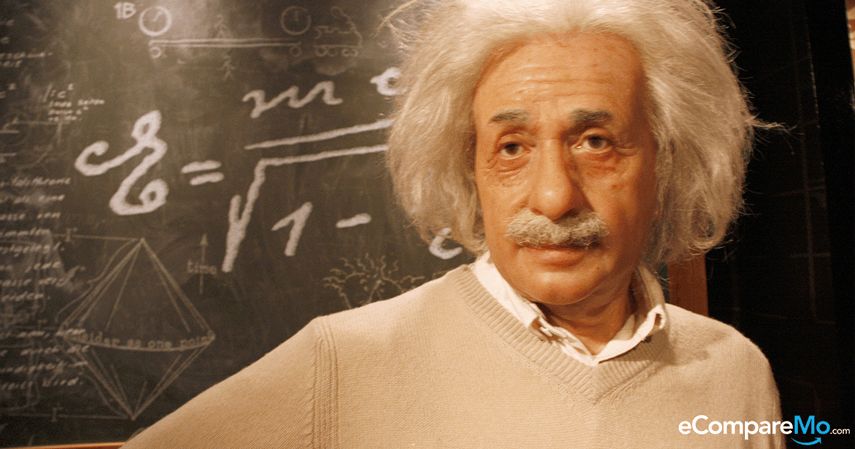5 Things Entrepreneurs Can Learn From Albert Einstein
4 min readHe predicted the existence of gravitational waves 100 years before its groundbreaking discovery. What makes “the dopey one” so great?

In 1915, Albert Einstein published his general theory of relativity, a groundbreaking paper that rocked the scientific community and became the foundation of many modern scientific discoveries. Part of his theory predicted the existence of gravitational waves—which was recently proven by the Laser Interferometer Gravitational-wave Observatory (LIGO)—100 years after Einstein’s prediction.
Gravitational waves, according to the LIGO Lab, are ripples or waves created in the fabric of spacetime. One way to explain gravitational waves is “if you imagine spacetime is a tablecloth,” says Alfred Jayner of the International Business Times. “The heavier an object on the tablecloth, the more the material will bend and ripple. This distortion is similar to how gravitational waves work.â€
(See Related Topic:Â The Fil-Am CEO Who Wants To Live On Mars Shares One Simple Advice For Entrepreneurs)
Why are gravitational waves important and why should we care? For around a century, the existence of gravitational waves from bodies that don’t emit light has only been a mere speculation. With more specialized equipment being able to detect gravitational waves, objects like black holes can now be detected and measured based on the waves they created. This will allow us to “see†or “ hear†black holes, as we are yet to know more about them.
And that’s why, even a century after his great contributions to the scientific world, Einstein is still regarded as one of the greatest thinkers of all time.
What makes Albert Einstein so great, and what can entrepreneurs pick up from his life and legacy? Here are just some of genius traits you might want to emulate to become successful.
1. It is perfectly fine to start rough.
Before Albert Einstein cemented his status as one of the best thinkers of the 20th century, he was practically a nobody. According to Arthur Chung, the first president of Guyana, Einstein may have graduated from Swiss Polytechnic Institute at 21, but he was faced with the struggles of finding employment for two years. He was in fact a “slow learner” who failed his university entrance exam. And, having problems with his classes and professors, and having almost quit school, he had to work odd jobs to make ends meet. Even for the young Einstein, life was rough in the beginning—but that didn’t stop him from soldiering on to fulfill his destiny.
2. Don’t let others impede your way to success.
His name may already be synonymous with the word “genius,†but a lot of people weren’t expecting much from little Al from the city of Ulm in Germany. As an infant, his parents thought his head was way oversized for his body. As Kara Kovalchik of Mental Floss wrote, his mom and dad described him to his physician as a “monstrosity.†Growing up, his father wanted him to follow the path to technical occupation but knowing he wanted something else, he disobeyed his father’s wishes and pursued mathematics. He’s also famous for having a “bad memory.” While there may be obstacles in his road to success, he didn’t let any of them stop him.
3. Deal with unexpected challenges accordingly.
Einstein met the first love of his life, the Serbian Mileva Maric, while being a student at the Zurich Polytechnic. The couple got married in 1903 in Switzerland, where he worked as a lecturer at the University of Bern, and had two children. The two separated in 1914—and instead of moping due to their falling out, he decided to move to Germany to continue teaching. Unlike other people who succumb to sudden unfortunate events, Einstein moved on and did what he did best: teach people about the wonders of science.
(See Also:Â 7 Truths Behind Common Entrepreneurial Myths)
4. Find opportunities whenever, wherever.
Einstein didn’t start as a member of the academe immediately after graduation. After working several tedious jobs, he found himself working as an examiner at the Federal Office for Intellectual Property in Bern. As part of his job, he would review patent applications and read lengthy mathematical equations that came with the applications. While it may seem like a boring desk job, Einstein came across two technical problems that led him to challenge the existing notion of light and its relation to space and time.
5. There is no problem that can’t be solved.
At the end of the day, people may seem to credit Einstein’s success to his extreme intellectual capacity. However, not everything is merely due to his intelligence. While some people would rather take the easy road, he chose to dedicate his life to solving the mysteries of the universe and contribute to the field of science. To sum it up perfectly, the famous physicist once said: “It’s not that I’m so smart; it’s just that I stay with problems longer.†–Dino Mari Testa
